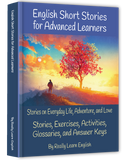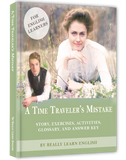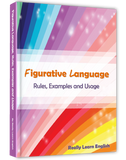English Short Stories for Advanced Learners
By Really Learn English (eBook Format)
(1 year access) (Learn More)
Over 500 pages of stories, exercises, activities, answers, word lists and definitions for advanced English learners (levels 10-12 of our English Levels Chart).
- Made specifically for ESL/EFL teachers and students
- Suitable for teenagers and adults
- Each story comes with a glossary (word lists + word meanings), exercises, fun activites, and an answer key
- Beautiful illustrations
- Interesting and engaging stories
Please note all materials are delivered in digital form. This means you will be able to download and print them.
Download a free sample chapter:
English Short Stories for Advanced Learners
Learn English Through Stories: Stories on Everyday Life, Adventure, and Love (Bonus Science Fiction and Fantasy Stories)
This resource contains over 500 pages of stories, exercises, glossaries (word lists + word meanings), exercises, partner activities, class activities, answers, and beautiful illustrations.
Since each story comes as a complete kit for the teacher or learner to use, you can significantly cut preparation time, while keeping the lessons effective and engaging.
Each section includes:
- a short story for advanced English learners (levels 10-12 of our English Levels Chart)
- full story glossary (word list + clear definitions)
- vocabulary questions
- grammar questions
- sentence structure questions
- comprehension questions
- essay questions
- role-play activities for working with a partner
- a fun group activity for a class
The stories and activities practice reading, writing, speaking, and listening.
Stories are interesting and engaging, while the activities are fun and more fast-paced, all contributing to a perfect lesson.
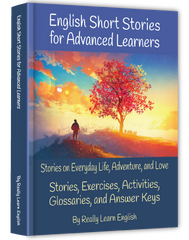
Our stories and exercises are made using our special method. It's a unique resource you will find nowhere else.
Here is a video of a sample story. It tells the story of Kate and Payton on a snowy day.
"Snowy Day" Story
(This video only includes the story itself. It does not include the story glossary, exercises, activities, and answers, which are in the full eBook.)
"A Tale of Two Jackets" Story
(This video only includes the story itself. It does not include the story glossary, exercises, activities, and answers, which are in the full eBook.)
Buy Now and Get These Bonus Resources:
A Time Traveler’s Mistake – a Story for English Learners
A time travel story for English learners at the advanced level (Levels 10-12 of our English Levels Chart). This book includes extensive reading practice, exercises, and fun activities.
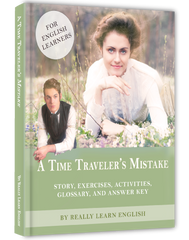
Figurative Language, Rules, Examples, and Usage
The complete guide to figurative speech in writing. It includes similes and metaphors, idioms, clichés, puns, and more.
To truly understand English, you must have knowledge of the most common types of figurative language.
Here you will find the principles of figurative speech and how it is used to bring beauty and life to words.
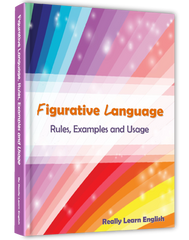
What does figurative mean?
Figurative means that words are used in a way that is different from the usual meaning. That way the description is more interesting or impressive. Figurative language creates a picture in your mind.
For example:
He is about to explode!

We do not mean to say that the man will actually explode. We only want to say that he is extremely angry.
So we use the verb "explode" in a figurative way. In other words, we use a word that usually describes something else.
That way the description is more interesting. It creates a certain picture in the mind.
The opposite of figurative is literal.
Literal means that you mean what you say exactly.
For example:
He is about to explode!

Here we do mean to say that the man will actually explode. The man holds fireworks, and it looks dangerous enough to explode.
So here we use the verb "explode" in a literal way. In other words, we use the usual meaning of the word.
Learn all about figurative language to improve your writing and your understanding and enjoyment of literature.
English Short Stories for Advanced Learners
Table of Contents
Watch a video Table of Contents to illustrate the stories (with sound):

